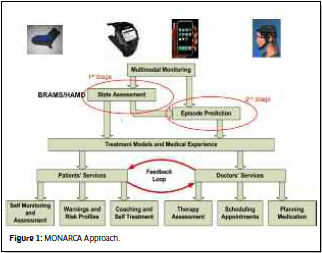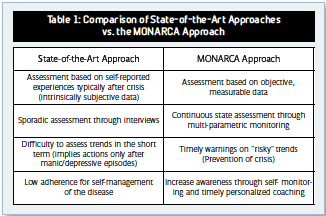By Oscar Mayora Ibarra
Bipolar disorder, also known as Manic-Depressive illness, is the sixth leading cause of disability in the world according to the World Health Organization. Statistics show that people affected by bipolar disorder lose, on average, 13.1 years of their productive life as a consequence of the illness. Moreover, Unipolar major depression is considered the leading cause of disability worldwide with 43 years lost in terms of productivity. Therefore, there is a clear need to manage and reduce the negative impact that these diseases have on social and economic spheres.
Bipolar disorder is diagnosed in around 1% of the European population, 2.6% of the population in the U.S., and at least one alternate manic-depressive episode occurs in around 10% of the world population during their lifetime.
For these reasons, the European Commission decided to finance research efforts targeted at supporting therapy and selfmanagement of people suffering from bipolar disorder.
An example of this is the recently funded EU project MONARCA (MONitoring, treAtment and pRediCtion of bipolAr disorder episodes) coordinated by CREATE-NET Research Center with the collaboration of several international partners (EC Funding of near 4 Million Euro). MONARCA is thoroughly investigating aspects of bipolar disorder by adopting a holistic approach to assessment, treatment and self-management of the disease. The project focuses on objective assessment and prediction of bipolar disorder episodes and aims to further advance the discovery of new markers for this disease.
The project utilizes state-of-the-art methodologies for treating Bipolar Disorder based on pharmacological, psychotherapeutic methods and clinical scales (e.g. BRAMS, HAMD, self assessments); developing and validating a multi-parametric, closed-loop approach to improve the treatment, management, and self-treatment of bipolar disorder disease.
MONARCA is an innovative system, which consists of five main components – a sensor- enabled mobile phone, a wrist-worn activity monitor, a novel sock integrated-physiological sensor (GSR, pulse), a stationary EEG system for periodic measurements and a home gateway. MONARCA will combine GPS location traces, physical motion information, and recognition of complex activities (eating habits, household activity, amount and quality of sleep) into a continuously updated behavioral profile that will be provided to doctors in a meaningful way to support treatment. The information based on sensing technologies will be used as an objective basis for discovering trends and predicting episodes of bipolar disorder.
In this manner, the patient’s medical record will correspond more accurately with the patient’s condition and medical staff can elaborate their diagnosis based not only on self-reported experiences by the patient, but also on objectively measured information sourced from the physical and physiological sensors.
The MONARCA system includes a closed-loop approach between patients and medical staff realized through purpose-built interfaces. On one hand, people affected by bipolar disorder will be aided by mechanisms of self-assessment, provision of warnings and risk profiles through persuasive interaction and coaching to support self treatment. On the other hand, the medical staff will have access to interfaces for interpreting patient data, therapy assessment, medication planning and scheduling visits tools, developed by the project (see Fig. 1).

In order to become a useful tool for patients and doctors, MONARCA’s research effort is based on close collaboration with two hospitals who are partners of the project, namely Psychiatric Center Rigshospitalet (Denmark) and Psychiatric State Hospital of Tirol (Austria), allowing patients and doctors to be involved from the early stages of the project.
In this way, patients and therapists can interact with researchers and provide their feedback and requirements about usability and interaction with the system in order to maximize system adoption and give patients an active role in the decision-making and self-management of their disease. The main contributions of MONARCA beyond state-of-the-art of management of Bipolar Disorder disease are shown in Table 1.

Overall, the expected results of the MONARCA project include:
• Accurate assessment of bipolar disorder episodes through objective monitoring
• Prevention of crisis episodes through event prediction algorithms
•Identification of main and eventually new markers for diagnosis and treatment of bipolar disorder
• Support caregivers for handling treatment and risk situations
• Improve patients’ self-management of the disease
• Positively impact in reduction of healthcare costs
• System validation through dedicated trials in two European countries
Oscar Mayora Ibarra, Ph.D. CREATE-NET Italy oscar.mayora@create-net.org http://www.monarca-project.eu/
About Brenda Wiederhold
President of Virtual Reality Medical Institute (VRMI) in Brussels, Belgium.
Executive VP Virtual Reality Medical Center (VRMC), based in San Diego and Los Angeles, California.
CEO of Interactive Media Institute a 501c3 non-profit
Clinical Instructor in Department of Psychiatry at UCSD
Founder of CyberPsychology, CyberTherapy, & Social Networking Conference
Visiting Professor at Catholic University Milan.








